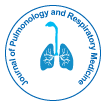Unsere Gruppe organisiert über 3000 globale Konferenzreihen Jährliche Veranstaltungen in den USA, Europa und anderen Ländern. Asien mit Unterstützung von 1000 weiteren wissenschaftlichen Gesellschaften und veröffentlicht über 700 Open Access Zeitschriften, die über 50.000 bedeutende Persönlichkeiten und renommierte Wissenschaftler als Redaktionsmitglieder enthalten.
Open-Access-Zeitschriften gewinnen mehr Leser und Zitierungen
700 Zeitschriften und 15.000.000 Leser Jede Zeitschrift erhält mehr als 25.000 Leser
Indiziert in
- ICMJE
Nützliche Links
Open-Access-Zeitschriften
Teile diese Seite
Abstrakt
Understanding Pulmonary Emphysema: Causes, Symptoms, and Management
Devlena Khan
Pulmonary emphysema is a chronic and progressive respiratory condition characterized by the irreversible destruction of lung tissue and the development of abnormally enlarged air sacs, known as alveoli. This abstract provides an overview of pulmonary emphysema, exploring its primary causes, common symptoms, and available management strategies. Pulmonary emphysema primarily results from long-term exposure to irritants, most notably cigarette smoke. Inhalation of these irritants triggers inflammation, which leads to the breakdown of the lung's elastic fibers and the eventual destruction of alveoli. Genetic factors, such as alpha-1 antitrypsin deficiency, can also contribute to the development of emphysema. Emphysema often manifests with a range of debilitating respiratory symptoms. Shortness of breath, especially during physical activity, is a hallmark sign. Other common symptoms include chronic cough, wheezing, and excessive mucus production. As the disease progresses, individuals may experience weight loss, fatigue, and decreased tolerance for exercise.pulmonary emphysema is a chronic lung condition with significant implications for patients' respiratory health. Understanding its causes, recognizing its symptoms, and implementing appropriate management strategies are vital for improving the lives of those affected by this debilitating disease. Early intervention, especially smoking cessation, plays a pivotal role in slowing its progression and enhancing patients' long-term outcomes.
Zeitschriften nach Themen
- Allgemeine Wissenschaft
- Biochemie
- Chemie
- Genetik und Molekularbiologie
- Geologie und Geowissenschaften
- Immunologie und Mikrobiologie
- Klinische Wissenschaften
- Krankenpflege und Gesundheitsfürsorge
- Landwirtschaft und Aquakultur
- Lebensmittel & Ernährung
- Maschinenbau
- Materialwissenschaften
- Medizinische Wissenschaften
- Pharmazeutische Wissenschaften
- Physik
- Sozial- und Politikwissenschaften
- Umweltwissenschaften
- Veterinärwissenschaften
Klinische und medizinische Fachzeitschriften
- Anästhesiologie
- Augenheilkunde
- Betrieb
- Dermatologie
- Diabetes und Endokrinologie
- Gastroenterologie
- Genetik
- Gesundheitspflege
- Immunologie
- Infektionskrankheiten
- Kardiologie
- Klinische Forschung
- Medizin
- Mikrobiologie
- Molekularbiologie
- Neurologie
- Onkologie
- Pädiatrie
- Pathologie
- Pflege
- Toxikologie
- Zahnheilkunde

 English
English  Spanish
Spanish  Chinese
Chinese  Russian
Russian  French
French  Japanese
Japanese  Portuguese
Portuguese  Hindi
Hindi